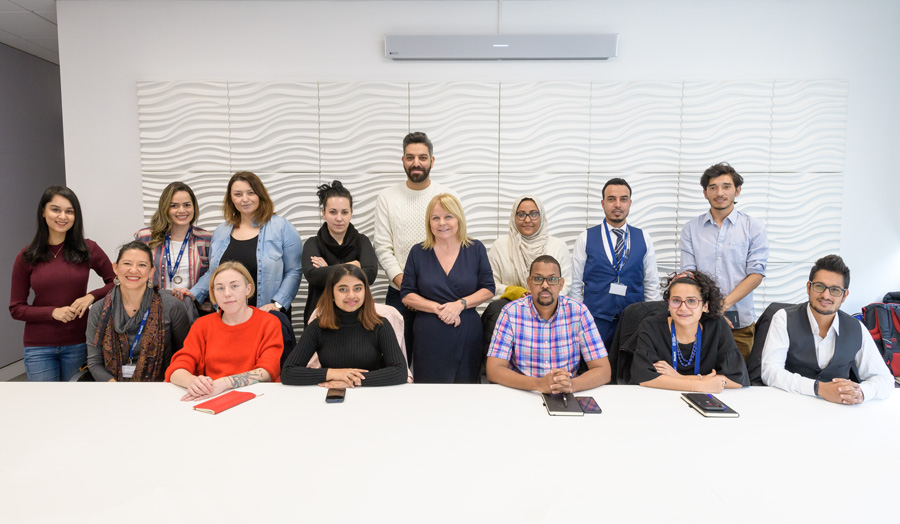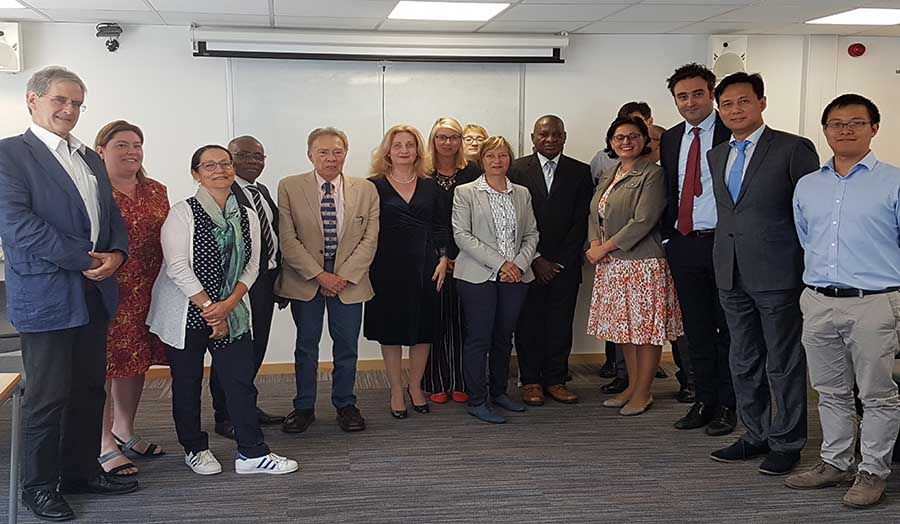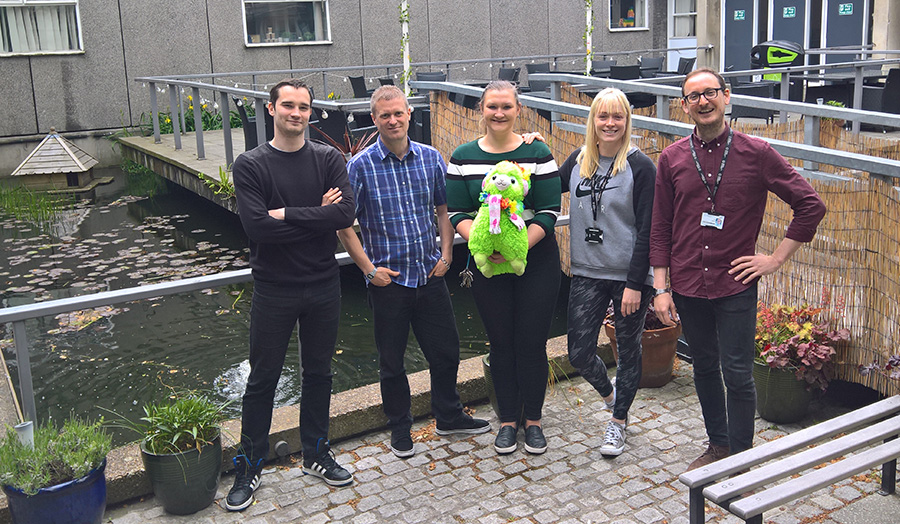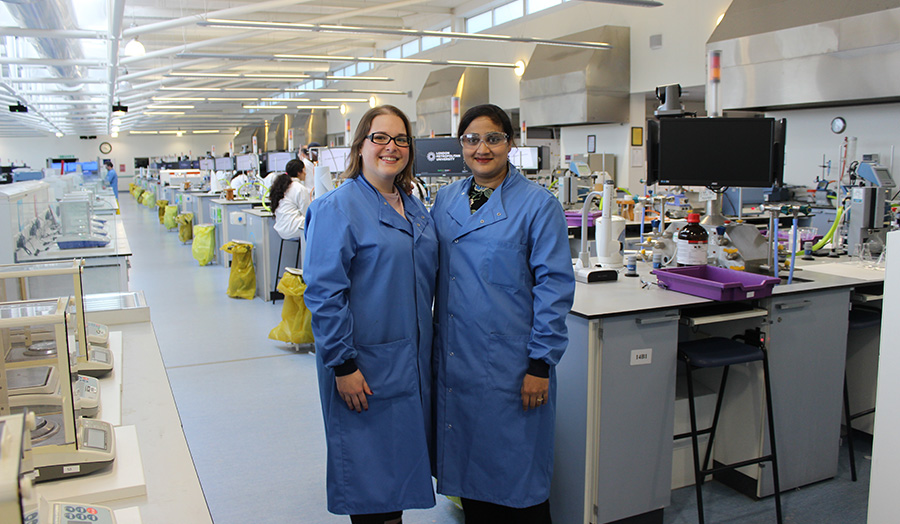Apply for this course
Please select when you would like to start:
Use the apply button to begin your application.
If you require a Student visa and wish to study a postgraduate course on a part-time basis, please read our how to apply information for international students to ensure you have all the details you need about the application process.
Why study this course?
London Met has won several prestigious awards for corporate social responsibility (CSR) and environmental sustainability, and with this course, we aim to train sustainability managers of the future with a focus on employee engagement, environmental law, supply chain and environmental economics.
Take your career to the next level
This course is aimed at middle management professionals and technical specialists who are already working in CSR and sustainability who have an interest in expanding their knowledge
Study at an award-winning institution
We have won several prestigious awards for its corporate social responsibility and environmental sustainability
Ranked first for teaching quality
Our business and management courses are ranked first for teaching quality in the Guardian University Guide 2023
Course modules
The modules listed below are for the academic year 2024/25 and represent the course modules at this time. Modules and module details (including, but not limited to, location and time) are subject to change over time.
Year modules
Data Analysis for Global Business
This module currently runs:spring semester - Tuesday evening
(core, 20 credits)
This module offers students a critical understanding of data and different techniques employed for data analysis in relation to the global business.
To provide students with practical skills necessary to undertake data analysis for global business, the aims of the module are:
- to introduce methods for data handling
- to discuss mathematical and statistical foundations for data presentation and analysis
- to develop thorough analysis and synthesis of theory and practice in relation to the subject areas
- to foster a critical awareness and deep interest in global business issues
- to master steps in formulating an econometric model
- to provide an opportunity to students for critical self-reflection, studying and data analysis skills and knowledge.
The module uses Bloomberg for teaching delivery and enables students to join the elite group of Bloomberg users around the world. The module also enables the development of expertise in the use of packages such as SPSS, EViews and NVivo to analyse data.
Note: If there are not sufficient student numbers to make a module viable, the School reserves the right to cancel such a module. If the School cancels a module it will use its reasonable endeavours to provide a suitable alternative.
Read full detailsEnvironmental Economics and Investment
This module currently runs:autumn semester - Tuesday evening
(core, 20 credits)
Environmental Economics and Investment is a Level 7 module which is core to MSc Corporate Social Responsibility and Sustainability. It is one of the optional Economics modules studied on other courses.
The Environmental Economics and Investment module considers in depth the issues faced by governments and businesses in the face of climate change and other global trends in relation to the environment and the economy. It extends their understanding of the complex and critical relations between man and nature in the processes of economic reproduction.
The module assesses the standard economic principles in their use as tools to investigate the causes, consequences and the possible solutions to problems of environmental degradation and climate change. The three major themes in the module are (i) the determination of the ‘optimum’ levels of environmental resource usage (ii) the analyses of alternative ways of attaining those targets and (iii) the impact of these actions on business decision making.
The crucial notion of 'sustainability' is a key to the investigation. So are the proximate and underlying causes of environmental problems. The main aim of the module is to introduce students to the established economists’ way of analysing environmental problems, and to explore the evolving methodologies prompted by the environmental crisis now upon us.
Note: If there are not sufficient student numbers to make a module viable, the School reserves the right to cancel such a module. If the School cancels a module it will use its reasonable endeavours to provide a suitable alternative.
Read full detailsFundamentals of CSR and Sustainability
This module currently runs:autumn semester - Wednesday afternoon
(core, 20 credits)
The field of corporate social responsibility has practically transformed our world and reoriented the way corporate entities conduct and perceive their operational activities. Corporate managers and those who represent corporate entities are expected to always behave ethically. Modern societies now expect that solutions to our social and environmental problems cannot only be the prerogative of nation governments, businesses of the 21st century have a lot to contribute when finding solutions to these problems. The demands modern stakeholders put before corporate entities have continued to increase; tomorrow’s managers need to know how to meet these demands. Some scholars have in fact argued that corporate social responsibility has drawn our attention to some of the excesses which globalisation has brought unto the corporate scene in the 21st century. We have seen some unacceptable practices which have accompanied globalisation and consequently made the job of CSR and what it advocates much more difficult. Many things have been made a lot more challenging for everyone because of this. We cannot ignore the adverse impacts of these excesses. There are several unacceptable practices in the form of injustices and human rights abuses, extreme poverty in several nation states both - emerging and even some advanced nations, environmental degradation, some irresponsible and reckless practices by some corporate leaders and terrorism on a very large scale. In recent years, a number of social, economic and environmental problems have continued to cause concern to us all, for example, climate change, waste management and irresponsible use of our depletable resources just to mention a few. Sustainable Development is a buzzword in CSR; both corporate and individual citizens still need to demonstrate that we are serious in executing what sustainable development means to us, what it requires from us all and how the needs of future generations of all inhabitants of this planet would be sustainably met; these are issues tomorrow’s managers would need to know how to embed in corporate strategies. This module aims to lay the foundation on how modern managers should address these and other CSR related issues.
Note: If there are not sufficient student numbers to make a module viable, the School reserves the right to cancel such a module. If the School cancels a module it will use its reasonable endeavours to provide a suitable alternative.
Read full detailsPractical Sustainability
This module currently runs:spring semester - Wednesday afternoon
(core, 20 credits)
This module enables the student to have the opportunity to become familiar with the award-winning practical achievements of the University in the area of environmental protection.
This will incorporate an introduction to the practices and achievements of the University’s Sustainability Department. It will lead to a one-day practical training to undertake an environmental audit, organised by the University Estates Department, followed by a Practical Audit exercise conducted among University employees. Completion of this exercise will lead to the award of the Certificate in Environmental Auditing
During the semester the students will be addressed by professional environmentalists and managers involved in changing their industries to meet and raise environmental standards.
Students will also have the opportunity to work with staff organising the ‘Green Week’ held in the spring in the University, contributing to the talks’ series, and be invited to listen to the attendant outside speakers.
Students will have the opportunity to receive environmental auditor training which is accredited by the Institute of Environmental Management and Assessment. After receiving the training, students will undertake a practical exercise to audit University staff including those who may have completed the National Union of Students Green Impact scheme.
Site visits may be made. Past visits have included Sadler’s Wells Theatre, Islington Borough Bunhill Combined Heat and Power site, and Cancer Research-UK. This will allow students to become familiar with different technologies and techniques that can be used to reduce the environmental impact of buildings.
Subsequently the students will be required to prepare a three thousand word proposal for a sustainability report.
The proposal may be a function of a work experience, or the result of independent research. Students will investigate a sector, an organisation, an industry or issue with the aim of making clear recommendations from the research carried out. Each student will agree a topic for the report with the module leader.
Note: If there are not sufficient student numbers to make a module viable, the School reserves the right to cancel such a module. If the School cancels a module it will use its reasonable endeavours to provide a suitable alternative.
Read full detailsBusiness Consultancy Project-portfolio assessment
This module currently runs:summer studies - Friday morning
autumn semester - Friday morning
spring semester - Friday morning
(alternative core, 60 credits)
This module provides you with the opportunity to work on specific business issues that organisations are facing. Utilising your competences of handling and managing business challenges, starting from problem identification and concluding with solution-related recommendations, thus encouraging research into real world business issues impacting organisations.
Useful and applied business research, like useful reflection, leads to change. To that end, students will be encouraged to take a pragmatic approach to their research, seeking always to create actionable conclusions of value to business managers, owners and entrepreneurs.
The aims of the module are to:
1. Foster a critical awareness and deep interest in a management/business issue or topic associated with their subject specialist area and to combine knowledge and analyses acquired in modules to explore that topic in depth
2. Enable students to produce a full business research report and a management summary on an appropriate topic to a professional and engaging standard that provides the basis for action.
3. Encourage reflection to critically evaluate the success of a business-related project and assess personal competence in the light of current knowledge and skills.
4. Build each student’s knowledge and confidence in their chosen subject to facilitate employability.
The expectation is that students will undertake research in areas of interest to them that is in context to their chosen programme and that develops knowledge and skills that support employment. Examples of possible areas of research include:
• Evaluation of an opportunity to enter a new market e.g. is it feasible for a low cost airline to enter the market in Brazil?
• Evaluation of a specific firm’s strategy and performance e.g. how is Ford responding to the advent of electric vehicles, driverless technology and ride sharing?
• Analysis of the impact of technology change on a company, industry or sector e.g. how will driverless technology and ride sharing impact on car ownership?
• Analysis of trends to create potential strategic scenarios for a firm or industry e.g. what are the future scenarios for law firms in the light of the adoption of AI?
• Analysis of competition in a specific market or industry e.g. global competition in the rapidly growing e-bike industry
• Identifying solutions to a specific business problem e.g. with a small or medium sized business e.g. what needs to be done to grow the business to the next level
• Analysis of disruption in an industry and the implications for a specific incumbent e.g. how should a black cab driver respond to Uber and other ride sharing platforms?
• Analysis of the effect of government intervention in a particular industry e.g. the current trade dispute over subsidies to Boeing and Airbus
• Response from Banks and FIs to the changing customer interaction and business landscape in the post pandemic era
Dissertation
This module currently runs:summer studies - Wednesday afternoon
autumn semester - Monday evening
spring semester - Wednesday evening
(alternative core, 60 credits)
This module provides students with the opportunity to undertake research projects on specific research questions related to their course.
Students will critically investigate issues cognate to their programme of study. The aim will be to make proposals or recommendations for the future and / or a contribution to extant theory.
Students are expected to utilise appropriate investigative techniques and standards of data collection and analysis as they write their postgraduate research-based dissertation.
The dissertation will be 10,000 words in length.
The dissertation module has the following aims:
1. To facilitate a detailed investigation of one area or topic within the subject field;
2. To develop a thorough analysis and synthesis of theory, policy and practice in relation to the chosen topic;
3. To provide an opportunity for critical reflection on the research topic.
The expectation is that students will undertake research in areas of interest to them that is in context to their chosen course; the research supervisor will be allocated by the subject area within which the course is located.
Read full detailsBusiness Work Placement Project
(option, 20 credits)This module is designed to enable postgraduate students the opportunity to gain a minimum of 30 days work experience relevant to their course, to evaluate the activities of the host organisation, to carry a work-based project or piece of research, to identify and articulate skills and knowledge developed during the placement and to obtain employer feedback.
Financial Regulation and Compliance
This module currently runs:spring semester - Thursday evening
(option, 20 credits)
The module examines the theoretical and applied aspects of regulation and compliance in the financial services industry. Relevant theories, models and empirical evidence are used in the analysis of regulatory and compliance issues across the globe.
This module is aimed to present a set of principles that enable students to understand better the scope of substantive regulation and compliance from local and global perspectives. This module provides the opportunity to students for assessing regulatory choices on specific policy issues and encourages critical reflection on the design of regulation. Students also have the chance to study the forces which have shaped financial regulation and to probe the purpose and nature of financial regulation. As regulation increases and changes are ongoing, the demand for clear guidance on navigating daily compliance issues is greater than ever. Students have opportunities to discuss regulatory concepts and their practical applications including the latest compliance strategies and regulatory information.
This module aims to develop:
- awareness and understanding of theory and practice of the role of the financial regulation and compliance in the financial services industry.
- a reflective approach to the analysis of issues relating to prudential regulation, conduct of business, compliance functions, customer due diligence and dispute resolution.
- problem-solving skills for addressing regulatory and compliance challenges of surveillance and combating of money laundering, terrorism, corruption, insider dealing, and other forms of financial crime at a local and global level.
Note: If there are not sufficient student numbers to make a module viable, the School reserves the right to cancel such a module. If the School cancels a module it will use its reasonable endeavours to provide a suitable alternative.
Read full detailsGrowth, Trade and Development
This module currently runs:autumn semester - Monday evening
(option, 20 credits)
This module will enable the students to understand the relations between trade, growth and economic and social development. The focus will be on the continued evolution of the international division of labour, its causes and the consequences for economic development, overall economic growth and social change.
The module examines the consequences of trade for policies of development in the developing and poorer countries. It examines the issues facing these countries in relation to the opportunities and challenges raised by the practices of international trade. It provides an outline of key issues that have defined theory and trading and economic practice. It allows an understanding of different approaches to these issues and how these have both developed over time and recurred.
The discussion of trading activities and their impact on economic development in practice, allows students to assess trade policies against the different needs of developing countries. The different political (philosophical) approaches to the use, regulation of, and spontaneous adjustment to trading opportunities, will be examined in the light of their real results and subsequent challenges. This module will be extending the theory and empirical work on trade to discuss the impact of Trade and Investment on economic growth and social development.
Upon completion of the module, students will be able to understand the distinction between economic growth and economic and social development, be able to explain the different theories of the relations between trade and economic growth and development and be able to explain the contending explanations of the relation between economic growth and development.
Note: If there are not sufficient student numbers to make a module viable, the School reserves the right to cancel such a module. If the School cancels a module it will use its reasonable endeavours to provide a suitable alternative.
Read full detailsInternational Corporate Finance
This module currently runs:autumn semester - Wednesday evening
(option, 20 credits)
This module explores the theoretical underpinnings and empirical evidence concerning the activities of corporate finance from an international perspective. The module offers students the opportunity to develop their knowledge in a range of areas related to the international financial system, theories explaining foreign exchange rate behaviour, hedging currency risks, sources of finance for international trade and investment projects for both large and small firms, the effect on international capital structure of investment decisions, risk exposure and risk management, cross-border mergers and acquisitions, and multinational working capital management. These topics will be dealt with the overall framework in relation to international corporate activities.
The module aims to:
- provide a framework for students to explore corporate strategies and decisions in an international perspective.
- Offer a conceptual framework for students on corporate strategies and decisions from an international perspective.
- a study on the application of relevant theories, models and empirical evidence for the analysis and evaluation of major corporate activities and decisions made by global firms.
The module uses Bloomberg for teaching delivery and assessment and enables students to join the elite group of Bloomberg users around the world.
Note: If there are not sufficient student numbers to make a module viable, the School reserves the right to cancel such a module. If the School cancels a module it will use its reasonable endeavours to provide a suitable alternative.
Read full detailsInternational Logistics
This module currently runs:spring semester - Monday morning
spring semester - Monday afternoon
spring semester - Thursday afternoon
spring semester - Thursday morning
summer studies - Monday morning
summer studies - Monday afternoon
(option, 20 credits)
This module will enable you to understand the actual processes of the exchange of goods and services between partners in global trade, and the logistical arrangements within transnational corporations across state and regional boundaries. The focus will be on the economic imperatives which have influenced the development of global supply chain management, the micro-economic dynamics affecting the transport and logistics sector and the disruptive trends which are transforming the industry. It will include increasingly relevant concerns such as ethics and sustainability in global supply chains and the importance of understanding risk, especially in developing markets.
The module aims to introduce you to the different theories, methodologies and data sources which will allow you to monitor and understand the logistical strategies developed by the major global producers and consumer goods intermediaries. These connections and processes are part of the development of global trade and economic growth, and have profound consequences for economic and social development.
The aims of the module are:
1 To provide you with an understanding of the nature of logistics studies.
2 To ensure that you are able to explain the different theories and techniques applied to the study of logistics
3 To enable you to understand the types of logistics companies and the processes they use in moving goods around the world.
4 To define and explain to you supply chain management concepts, such as the trade-off between inventory and transport costs, which have influenced the production strategies of multinational enterprises.
5 To outline the types of technologies used to provide visibility in the supply chain and increase efficiency.
6 To provide an overview of the disruptive innovations which are being developed to make international logistics more efficient, and the impact these will have on supply chain strategy.
7 To explain the increased level of risk, which has evolved through the relocation of production processes to developing countries and how multinational enterprises should deal with it. Global waste recycling issues.
8 To provide a background to the increasingly important role which ethical and environmental factors play in the development of sustainable and economically viable supply chains. The circular economy.
Read full detailsLeading and Developing People
This module currently runs:spring semester - Monday morning
spring semester - Monday afternoon
spring semester - Tuesday morning
spring semester - Tuesday afternoon
spring semester - Wednesday morning
spring semester - Wednesday afternoon
spring semester - Thursday morning
spring semester - Thursday afternoon
summer studies - Tuesday morning
summer studies - Tuesday afternoon
(option, 20 credits)
The aim of the module is to prepare students to lead and develop people in a complex international environment, to build high performance teams and to create a productive work environment and culture. Over the course of the module, you will learn from relevant contemporary research, theories, and examples of business practices both past and present.
Management and leadership go together in business organisations, with managers typically expected to lead others as part of their role. The module will examine the roles and responsibilities of manager and leader, and the demands on these roles in international, digitally enabled businesses.
Critical to the value of the module is the encouragement of continuous learning and reflection in order to be effective in a changing world. You will have the opportunity to assess their own capabilities using Strengthscope.
The aim of the module is to ensure that students will:
- understand the role of business leaders and business managers in creating successful business organisations, cultures and working environments
- have the necessary knowledge of leading, motivating and developing to enable them to take on a management role successfully
- be able to evaluate their own capabilities and skills in relation to managing themselves and leading others
- be equipped to assess the challenges associated with workplace change and make a valuable contribution to the management of change.
Sustainability in Global Companies
This module currently runs:autumn semester - Tuesday morning
autumn semester - Monday morning
autumn semester - Tuesday afternoon
autumn semester - Monday afternoon
(option, 20 credits)
This module will address the critical issue of how current thinking on sustainability will impact on businesses and organisations and how they respond.
The need to create more sustainable organisations and businesses is fundamental to current and future organisational development strategies, and it is necessary for students to understand the growing influence of the sustainability agenda on industry. This influence takes on many forms, from government policies and international agreements to the measuring of impacts of organisational practices on the ecology and communities. It is clear that in the future, organisations, businesses, communities and individuals will be expected to understand and take responsibility for their economic, environmental and social impacts. This module will examine the current and future challenges, it will equip students with knowledge to deal with the challenge of creating sustainable forms of business that operate within ecological and socio-economic limits.
It will explore the sustainability context, and how business practices will need to evolve to reflect the realities of operating within a globalised trading system that is striving to apply sustainability principles. This is an important area of increasing scrutiny for airlines and airports. Particular focus will be given to the importance of Sustainability reporting and reporting standards.
Read full details







.jpg)










